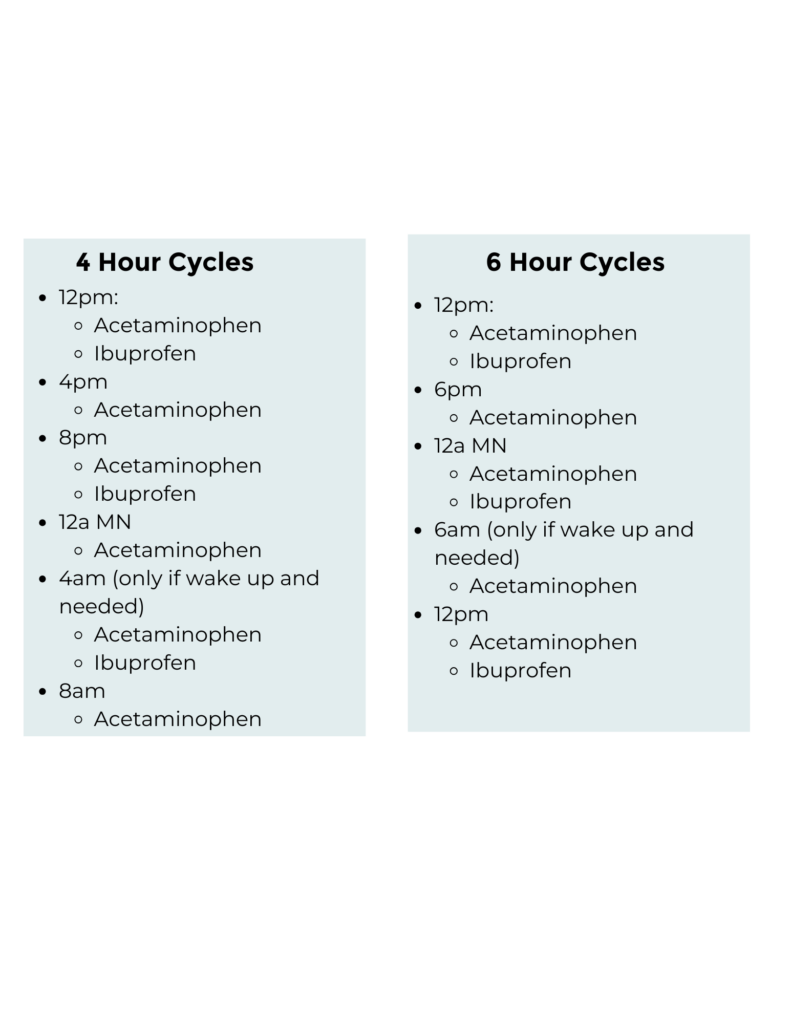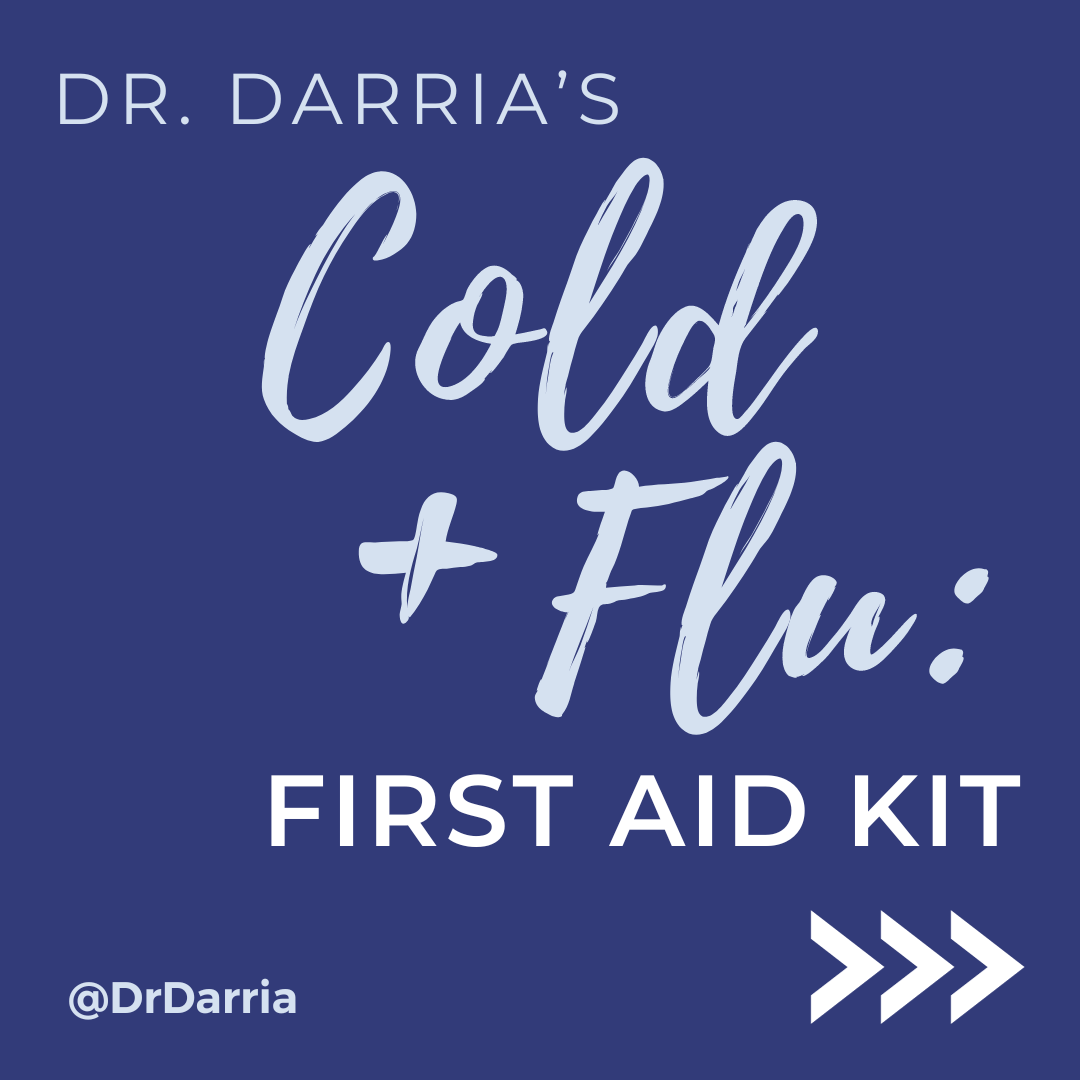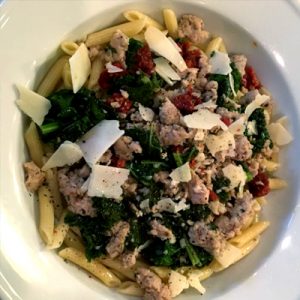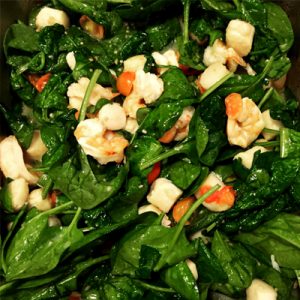Nothing is more confusing than the cold + flu aisle at your pharmacy. I mean, sometimes it feels like you need a PhD, just to make sense of it.
Let’s make that easier – because the LAST thing you want to do when you’re struggling with a cold and flu, is reading the fine-print on a drug label. (Recent headlines around Phenylephrine made this even more confusing.)
Guide Outline
- Where to buy these (my shopping lists)
- What to take for:
- For children
- For pregnant women
- When the cough JUST WONT GO AWAY
how to buy it?
To save you a trip to the store (and trying to search for everything online), I’ve collated all of these for you at these two links –
My Cold + Flu First Aid Kit - a symptom-directed approach
Use this information below as your “Go-To Resource” for the upcoming cold and flu season.
I drive treatment for the cold and flu focuses specifically on targeted symptomatic treatment, instead of just a scattered approach. Here’s your cheat-sheet.
Pain/Fever
- Acetaminophen (Tylenol) 650mg every 4-6 hrs for pain or fever. Do not exceed 4grams in 24hrs.
- Ibuprofen (Motrin or Advil) 600-800mg every 8-12 hrs for pain or fever
- Naproxen (Aleve) 1-2 tabs every 8-12 hours
- Chloraseptic Throat Lozenges: These contain menthol, which can help reduce coughs and open up clogged nasal passages. They also contain benzocaine, which is a topical anesthetic and not only helps a sore throat, but also can reduce a dry cough.
How to "Stack" Pain/Fever meds
- 4-Hour Cycle:
- 12pm:
- Acetaminophen
- Ibuprofen
- 4pm
- Acetaminophen
- 8pm
- Acetaminophen
- Ibuprofen
- 12a MN
- Acetaminophen
- 4am (only if wake up and needed)
- Acetaminophen
- Ibuprofen
- 8am
- Acetaminophen
- 12pm:
- 6-Hour Cycle
- 12pm:
- Acetaminophen
- Ibuprofen
- 6pm
- Acetaminophen
- 12a MN
- Acetaminophen
- Ibuprofen
- 6am (only if wake up and needed)
- Acetaminophen
- 12pm
- Acetaminophen
- Ibuprofen
- 12pm:
Nasal Pressure / Congestion - Over-the-counter
- Saline sprays: spray ample amount into nostrils, then blow out until you are able to clear congestion
- NeilMed Nasal Wash System: Similar to a netipot (below), but comes with premesasured salt packets and bottle, to make this really easy to use for ALL ages. Few drugs in the world can work as well as just washing out the nasal passages!
- Neti pot: accomplishes same as saline sprays, more effective (people swear by it), but some people find it uncomfortable
- Oxymetazoline (Afrin): This constricts constricts the vessels in the nostrils to decrease swelling and congestion. The downside? Using it for more than 72 hours can trigger rebound nasal congestion, so use sparingly (like before an important event, etc).
- Azelastine or Olapatadine (Rx only): These antihistamine nasal sprays can reduce the inflammation and allergic response.
- Steroid Sprays: Mometasone (Nasonex), Fluticasone (Flonase), Triamcinolone (Nasacort), Budesonide (Rx or OTC): Especially good when the cough or congestion is due to allergies, post-nasal drip, or just irritation from the congestion. Also, for someone with high blood pressure who cannot tolerate Pseudoephedrine, taking a nasal corticosteroid spray twice a day for 5-7 days can be almost as effective (but takes about a week to work).
- Pseudoephedrine (Sudafed): Temporarily dries/clears nasal passages. Pseudoephedrine is now sold only “behind-the-counter” and requiring ID, but it does not require a prescription. Now that the FDA is re-thinking their stance on Phenylephrine, it’s anyone’s guess if Pseudoephedrine comes back on the shelves.
- Phenylephrine: This had replaced pseudoephedrine in many medications (AND in many combinations), but the FDA may shortly pull it from medications, due to findings that it’s barely better than placebo. That said, if you have a good response to Phenylephrine, or you have high blood pressure or other options with Pseudoephedrine, then this is a fine option to continue to use.
- 2nd Generation Anti-histamine (Cetirizine: Zyrtec, Fexofenadine: Allegra, Loratidine: Claritin): Can reduce congestion, especially when triggered by allergens.
- Chloraseptic Throat Lozenges: These contain menthol, which can help reduce coughs and open up clogged nasal passages. They also contain benzocaine, which is a topical anesthetic and not only helps a sore throat, but also can reduce a dry cough.
- RULE OF THUMB: If you’re having to use these decongestants more than once or twice a month, on a chronic basis, then it’s time to stop just treating the symptoms, and instead trying to target what will decrease the production of mucus and post-nasal drip. Talk to your doctor about other options (below) such as nasal steroids, 2nd generation anti-histamines, or nasal antihistamine spray to use during the high allergy times.
CoughING - Over-the-counter treatments
- Dextromethorphan (Delsym, Mucinex): a “Cough Supressant”, meaning that it affects the “cough trigger” in the brain. I reach for this especially for a non-productive, dry cough. It may make some people drowsy, those most don’t have a problem.
- Guaifenesin (Robitussin Chest Congestion, Mucinex, Diabetic Tussin, Vicks Dayquil Mucus Control): Guaifenesin thins the mucus and helps make our coughs more productive (to get the junk OUT).
- Dextromethorphan and/or Guaifenesin with Codeine: Codeine can be added to expectorants (see below), so you get both expectorant and cough suppressant benefits. That said, (1) Codeine can be addictive (it’s a narcotic) and (2) it will make you sleepy. So, I reserve this for my patients with such a bad cough that it keeps them up all night, and have them use the lowest dose that’s helpful for them.
- Naproxen (Aleve): Yes – this is typically used for pain – but it actually works to reduce cough as well!
- Chloraseptic Throat Lozenges: These contain menthol, which can help reduce coughs and open up clogged nasal passages. They also contain benzocaine, which is a topical anesthetic and not only helps a sore throat, but also can reduce a dry cough.
- Antacid Medications: Why? Interestingly, in some patients, a chronic cough can trigger reflux, which makes the cough worse. (Separately, reflux alone can be it’s own trigger for chronic cough). In this case, a short trial of H2 blockers such as Famotidine (Pepcid AC, Pepcid Oral, Zantac 360) or Cimetidine (Tagamet, Tagamet HB), followed by a Proton Pump Inhibitor such as Omeprazole (Prilosec), Esomeprazole (Nexium), Lansoprazole (Prevacid), or Pantoprazole (Protonix), can be helpful.
coughing - prescription treatments
- Benzonatate (Tessalon Perles): this suppresses cough, specifically if you’re feeling a tickle/ gag at the back of your throat or feel like you keep having to clear your throat.
- Nasal steroids: Mometasone, Fluticasone, or Triamcinolone Nasal steroid sprays (Rx only): Since MANY coughs that last 2 weeks or longer are due to post-nasal drip, allergies, or just throat irritation from the congestion, nasal steroid sprays can be very helpful for a cough. They can be almost as effective as oral decongestants when used twice a day, but take about 5-7 days to work.
- (also then a good option for people who cannot take Pseudoephedrine)
- Prednisone: Even people without diagnosed “asthma”, can develop what’s thoguht of as “post-viral bronchospasm” after a respiratory virus. Your doctor can check for this with a physical exam. When that happens, a short course of oral steroids (5 days) can be useful.
- Albuterol inhaler: Opens up your airways, for the same reason as Prednisone above.
nausea remedies
- Ginger-based Lozenges and gums: Ginger is a natural nausea remedy
Vitamins / Herbal Remedies
- Zinc: The evidence for Zinc isn’t conclusive, but it’s strong enough that I take it and recommend it. A recent research paper found that if Zinc is taken within 24hrs of onset of cold symptoms, it significantly reduced the duration and severity of symptoms.
- ALWAYS take these supplements with food, as this can make you really nauseated.
- Avoid intra-nasal forms (On which the FDA put a warning due to disruption of smell).
- For other supplements, vitamins, and lifestyle changes that can help, read my post here.
Other Treatments
- Humidifier: A 2004 study of 319 patients showed that inhaling warm vapor reduced symptoms by 31% and decreased nasal congestion, and sleeping with one in your room can reduce congestion and coughing. Regardless, make sure that you clean it regularly, so you’re not spreading mold and mildew!
- Shower steam: Turn on the shower as hot as possible (don’t get in), and let it really steam up your bathroom. Hang out in there for 15 minutes or so, to allow the humidity to help clear out your airways.
- Salt Water Gargle: My mom used to make me do this – I swore she was just torturing me. But a saltwater gargle can actually relieve pain and inflammation. To truly make a “hypertonic” solution, combine at least 1/4 teaspoon of salt in a half-cup of warm water, gargle, and spit.
For Children
For infants + children, please see my “Cold + Flu Survival Guide – Infants + Children“
For Pregnant Women
- Pregnancy can add a challenging wrinkle to many therapies that we typically use to treat colds and the flu. Patients and physicians must weigh the risks and benefits, and in many of the therapies, conclusive evidence is simply lacking in human models.
- Since most of the above therapies do not shorten the duration of the illness, but simply help symptoms, it’s best for pregnant women to simply stick to those therapies that have the greatest safety data.
- Heated humidified air for congestion
- Acetaminophen (Tylenol) for sore throat, headaches, and fever
- Other therapies, such as Ipratroprium bromide nasal spray have reassuring data in animals, but not specifically in humans, and should only be taken after a discussion with your physician. Zinc and Vitamin C are not advised to be taken in pregnancy as they have been shown to have detrimental effects on the fetus at high doses.
For the cough that just wont go away
- For adults, a “chronic cough” is defined s a cough lasting anywhere from 4-8 weeks or longer. That’s pretty miserable.
- Post-infectious (or post-viral) cough symptoms: tends to be dry, possibly worse at night, and is annoying, but not really troublesome. (VIDEO on post-viral cough). It’s usually triggered by a combination of (1) post-nasal drip and (2) cough trigger sensitivity. So, tackle it by directly targeting these two mechanisms.
- First combo to try: (1) Oral anti-histamine + (2) nasal anti-histamine or nasal steroid spray + (3) steroid inhaler
- To reduce post-nasal drip
- Oral Anti-histamines (NOTE: first-generation anti-histamines such as Benadryl are more sedating, but have better anticholinergic effects, meaning they’re better at treating cough due to the cold)
- Examples 1st gen: Diphenhydramine (Benadryl), Doxylamine (Nyquil, Tylenol Cold + Cough Nighttime), Brompheniramine (Dimetapp), Chlorpheniramine, Clemastine (Dayhist)
- 2nd Gen for less sedation
- Nasal antihistamines: Azelastine (Astelin)
- Nasal steroid spray: Fluticasone nasal (Flonase)
- (and all other remedies listed above for post-nasal drip)
- Leukotriene inhibitors: Montelukast (Singulair)
- **NOTE: relief often requires a combination of the above, such as an anti-histamine (Allegra), nasal steroid spray (Flonase) ,and Leukotriene inhibitor (Singulair) all being taken
- Oral Anti-histamines (NOTE: first-generation anti-histamines such as Benadryl are more sedating, but have better anticholinergic effects, meaning they’re better at treating cough due to the cold)
- To reduce cough trigger sensitivity:
- Tessalon perles (Rx only)
- Oral prednisone (steroid, Rx only)
- Inhaled steroids: Fluticasone (Flovent), Budesonide (Pulmicort), Beclomethasone (QVar), Budesonide / Formoterol (Symbicort), Fluticasone / Salmeterol (Advair)
- Anti-cholingergic inhaler: Tiotropium (Spiriva), Ipratropium Bromide (Atrovent)
- Beta agonist: Albuterol inhaler (Rx only), Budesonide/Formoterol (Symbicort)
- Gabapentin (some studies show that it can help in severe cases of sensory/neuropathic cough)
- Humidified air
- Robitussin DM or Robitussin with Codeine (sometimes this latter is the only thing that will help people sleep at night, but it has codeine – a narcotic, so must be used EXCEEDINGLY sparingly)
- NSAIDs (see above – NSAIDs can actually help suppress cough)
- When to see a doctor:
- Prolonged cough can also represent infection (including pertussis / whooping cough, which in adults does not make the classic “whoop” sound), and in that case, require antibiotics to reduce transmission. Pertussis is called the “100 day cough” because the cough lasts so long. Other typical symptoms include coughing spasms that are severe, cause vomiting, urinary incontinence, or even fainting.
- You were getting better, then got worse (like when a dry cough becomes a prolonged “wet cough”
- You’re having fevers after 5 days
- You’re short of breath or just having trouble breathing
- Cough that is more of a “throat clearing” or worse after certain foods (or medications such as steroids or some inhalers), which could actually be more of a sign of GERD/reflux.
- You’re on an ACE inhibitor (which can itself trigger cough)
- Your gut just says something is wrong.
Overall
Overall, remember that viral infections typically last 7-10 days, which is how long it takes our immune system to recognize and fight them. In addition to staying hydrated, getting plenty of rest, doing some gentle activity when you can (but avoiding strenuous workouts), and limiting alcohol, you can take the medications above, to help you feel better, in the meantime.
If your symptoms last longer than 10 days, or your cough is lasting longer than 2 1/2 -3 weeks, talk please see your doctor.
GUIDANCE:
All my best,
- Dr. Darria








